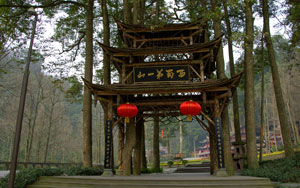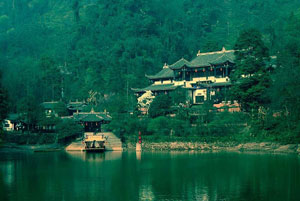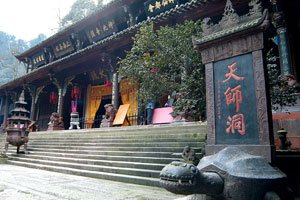
Qingcheng Mountain
Back
Mount Qingcheng and the Dujiangyan Irrigation System are two state-level scenic attractions in China. Both are located west of Chengdu, the capital city of Sichuan Province. Mount Qingcheng, known as the fifth among the most famous Taoist mountains of China, is one of the places where Taoism came into being. With the snow-covered Mingshan Mountain in the background and the Chuanxi Plain in front, the evergreen Mount Qingcheng covers an area of over 120 kilometers. Altogether it has 36 peaks covered with thick forests of trees and bamboo, 72 caves and 108 scenic spots. It gets its name from the way the peaks resemble the structure of a city wall. The name Qingcheng means green city. Damian Mountain is its main peak and the Master's Cave (Tianshitong) serves as its pivot. The mountain is well known for its serene scenery that contains halls and temples shaded by forests and enhanced by interesting legends and anecdotes. The Dujiangyan Irrigation System is a pearl in the water works construction of ancient China. Built over 2,200 years ago, it still provides benefits for the people. The irrigation system was erected on the Minjiang River at the foot of Yulei Mountain, northwest of Dujiangyan City in Sichuan Province. Here the Minjiang River, after being joined by many tributaries in its upper reaches, runs toward the Chengdu Plain. As the Yulei Mountain originally blocked the river so that water could not flow eastward, the plain had no access to river irrigation and agricultural development in the region was therefore seriously affected. Li Bing, governor of Shu Prefecture during the Warring States period (475-221 BC), made a careful survey of the region and then had a channel cut through Yulei Mountain. He put a dyke in the middle of the Minjiang River to divide it into two parts. This happened about 250 BC. He also ordered the local people to open channels and canals on the plain so as to divert the river for irrigation purposes. This finally turned the agricultural potential of the plain into a land of abundance. |
   |
|
| |


